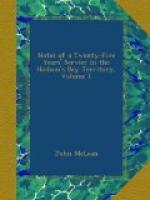The buffalo hunt affords much of the excitement, and some of the dangers, of the battle-field. The horses are often gored by the infuriated bulls, to the great peril—sometimes to the loss—of the rider’s life; serious accidents too happen from falls. There are no better horsemen in the world than the Red River “brules;” and so long as the horse keeps on his legs, the rider sticks to him. The falls are chiefly occasioned by the deep holes the badger digs all over the prairies; if the horse plunges into one of these, both horse and man roll on the ground. Fatal accidents, also, occasionally happen from gun shots in the melee; and it is said, I know not with what truth, that a wronged husband, or a supplanted lover, sometimes avails himself of the opportunity presented by the melee to miss the buffalo, and hit a friend—by accident.
A priest generally accompanies the camp, and mass is celebrated with becoming solemnity on Sundays. The “brules” attend, looking very serious and grave until a herd of buffaloes appear; when the cry of “La vache! la vache!” scatters the congregation in an instant; away they scamper, old and young, leaving the priest to preach to the winds, or perhaps to a few women and children. Two trips in the year are generally made to the prairie; the latter in August. The buffalo hunter’s life assimilates more to that of the savage than of the civilized man; it is a life of alternate plenty and want—a life also of danger and inquietude. The Indians of the plain view the encroachment of the strange race on their hunting grounds, with feelings of jealousy and enmity. They are, accordingly, continually on the alert; they attack detached parties and stragglers; they also set fire to the prairies about the time the “brules” set out for the hunt, and by this means drive the game beyond their reach. Owing to this circumstance, the “brules” have returned with empty carts for these two years past; and their only resource has been to betake themselves to the woods, and live after the manner of the Indians. Could they find a sure market for the produce of the soil, so as to remunerate their labour, there can be little doubt but that they might be gradually detached from the half-savage life they lead, and become as steady and industrious as their neighbours.
The English half-breeds, as the mixed progeny of the British are designated, possess many of the characteristics of their fathers; they generally prefer the more certain pursuit of husbandry to the chase, and follow close on the heels of the Scotch in the path of industry and moral rectitude. Very few of them resort to the plains, unless for the purpose of trafficking the produce of their farms for the produce of the chase; and it is said that they frequently return home better supplied with meat than the hunters themselves.




